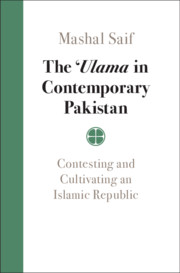Book contents
- The ‘Ulama in Contemporary Pakistan
- The ‘Ulama in Contemporary Pakistan
- Copyright page
- Dedication
- Contents
- Acknowledgments
- Note on Translation and Transliteration
- Introduction
- 1 The Clerics and the Council
- 2 Sovereignty between God and the State
- 3 Questioning State Identity and Legitimacy
- 4 Seeking Security
- 5 Minority Aspirations and the State
- Conclusion
- Bibliography
- Index
2 - Sovereignty between God and the State
Debating Muhammad’s Honor and Blasphemy1
Published online by Cambridge University Press: 20 October 2020
- The ‘Ulama in Contemporary Pakistan
- The ‘Ulama in Contemporary Pakistan
- Copyright page
- Dedication
- Contents
- Acknowledgments
- Note on Translation and Transliteration
- Introduction
- 1 The Clerics and the Council
- 2 Sovereignty between God and the State
- 3 Questioning State Identity and Legitimacy
- 4 Seeking Security
- 5 Minority Aspirations and the State
- Conclusion
- Bibliography
- Index
Summary
This chapter studies debates over sovereignty between the ‘ulama and the state. It does so by examining the killing of the Pakistani governor Salman Taseer and his alleged act of insulting Muhammad. The author asserts that in the case of Taseer’s killing, and in blasphemy cases more broadly, the issue of sovereignty boils down to the question of who can deem the insulter worthy of death and execute this punishment. The state, considering itself sovereign, reserves this right for itself. Consequently, it deemed Taseer’s extrajudicial killing a murder and awarded the death penalty to his assassin. The ‘ulama regard God as the ultimate sovereign. They assert that His sovereignty is vested in His law, the shari‘a, which they interpret and articulate. Many ‘ulama maintain that according to the shari‘a, insulting Muhammad is such a grievous crime that anyone can legitimately commit sovereign violence against a Prophet-insulter. Importantly, a minority among the ‘ulama support the state’s monopoly over legitimate violence. These ‘ulama also claim to formulate their arguments from within the shari‘a. In a broader sense, this chapter’s exploration of blasphemy intervenes in the debate of whether an Islamic state – i.e. a polity that demands its own sovereignty, but also emphasizes its reverence for God’s sovereignty – is possible.
- Type
- Chapter
- Information
- The 'Ulama in Contemporary PakistanContesting and Cultivating an Islamic Republic, pp. 76 - 137Publisher: Cambridge University PressPrint publication year: 2020

